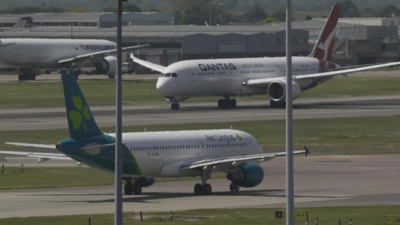Japan Engages in Crucial Trade Talks with U.S. Amid Tariff Uncertainty

In a significant diplomatic move, Japan's chief trade negotiator, Ryosei Akazawa, has embarked on a visit to Washington, marking his first trip since President Donald Trump enacted stringent tariffs that have stirred unrest in global trade relations. This visit sets the stage for discussions that are expected to outline the U.S. demands and provide insights into the motivations behind Trumps ongoing trade war.
Japan has emerged as a key player in the negotiations, positioning itself at the forefront of talks aimed at mitigating the harsh liberation day tariffs introduced by Trump, which have affected numerous nations. The president announced these levies on April 2, only to pause their implementation for 90 days in response to the ensuing market turmoil.
According to diplomatic sources, while Japan's role as a guinea pig in trade discussions might afford it a unique advantage over other countries, it also places Japan in a precarious position to gauge the U.S. administration's readiness to impose significant penalties on both allies and adversaries alike. Japan's trade surplus with the United States is ranked among the top ten globally, underscoring the importance of these negotiations.
The recent weeks have been filled with uncertainty, characterized by the weaponization of tariffs and aggressive rhetoric regarding trade. However, it remains unclear what specific outcomes Trump seeks from these negotiations, remarked an individual closely involved in the preparations for the talks.
Despite the discomfort of being in such a pivotal role, Japan's participation could help clarify the objectives and strategies that the U.S. intends to pursue in its trade policies.
Takeshi Niinami, chair of the Japan Association of Corporate Executives, commented that these talks would serve as a showcase for countries, markets, and businesses on how the Trump administration plans to negotiate, possibly setting a precedent for future dealings.
The two-day visit by Akazawa includes discussions with U.S. Treasury Secretary Scott Bessent and U.S. Trade Representative Jamieson Greer. This crucial engagement comes on the heels of Japanese Prime Minister Shigeru Ishiba declaring a national crisis regarding the potential impacts on trade and the economy.
Trumps imposition of a hefty 24 percent reciprocal tariff on Japan has caused considerable frustration, especially given Japans standing as a longtime military ally of the United States and its position as the largest foreign investor in the U.S. for the past five years. Although Trumps temporary suspension of the tariffs offers a slight reprieve, Japan continues to grapple with a substantial 25 percent tariff on automobile exports to the U.S., in addition to the baseline 10 percent tariff applied to many other trading partners.
Niinami observed that Bessents selection as the chief U.S. negotiator highlights Washingtons intent to press Japan on several fronts, including addressing the weakness of the yen and stabilizing the U.S. Treasuries market, where Japan holds approximately $1.1 trillion in foreign currency reserves.
Reports indicate that the U.S. has outlined several priorities for the discussions, focusing on increasing Japans imports of liquefied natural gas, enhancing Japanese market access to American agricultural products such as rice and wheat, and addressing varying safety standards for vehicles that complicate U.S. sales in Japan. However, the U.S. Treasury has yet to clarify its specific agenda for the talks.
Tokyo officials have expressed readiness to consider a broad array of issues during these negotiations, including potential agreements for Japan to purchase more defense equipment from the U.S., invest in American infrastructure, and collaborate on shipbuilding initiatives.
Reflecting on past dealings, in 2019, former Prime Minister Shinzo Abe, often referred to as the Trump whisperer for his close relationship with the president, swiftly brokered a trade deal with the U.S. that eased some restrictions on American agricultural exports while establishing a framework for digital commerce. Trump lauded the agreement as phenomenal, allowing Abe to tout it as a testament to the solid U.S.-Japan relationship.
Niinami suggested that the current negotiation landscape differs vastly from the previous administration's approach. This time, we have many more cards to play, but the circumstances surrounding these negotiations are not remotely similar, he noted.
Experts predict that Japan will prioritize the auto tariffs in its discussions with the U.S. Matt Goodman, a prominent expert on U.S.-Japan economic relations at the Council on Foreign Relations, indicated that Japan will likely push for a pause on the auto tariffs, which may prove to be a formidable challenge to negotiate.
Tobias Harris, founder of the political risk consultancy Japan Foresight, remarked on the lack of clarity regarding the U.S. negotiating objectives, suggesting that this ambiguity places Japan and Ishiba in a difficult position compared to the previous administration. I don't envision any quick solutions. If the U.S. seeks genuine concessions in agriculture, those are complex issues that won't be resolved swiftly, especially given the current climate, he stated. Moreover, it seems unlikely that Tokyo is willing to accept a subpar agreement.
Jeff Kingston, a foreign policy expert at Temple University in Japan, emphasized that the stakes in these negotiations are heightened by Japan's concerns regarding U.S. commitment to maintaining stability in Asia, where the U.S. plays a crucial role in security. Recent developments from the Trump administration, particularly its stance on Russias invasion of Ukraine, have increased fears that the U.S. might be less inclined to respond militarily to potential aggression from China towards Taiwan.
Furthermore, Japan's economy, heavily reliant on exports, is particularly susceptible to global economic downturns and any erosion of the international rules-based order. While Japan must adopt a strong public stance for local political reasons, it ultimately needs to ensure that it maintains amicable relations with Trump, Kingston observed. The real challenge lies in the fact that Trump often uses uncertainty as a negotiating tactic, placing Japan in a precarious position where it cannot afford to take risks.













